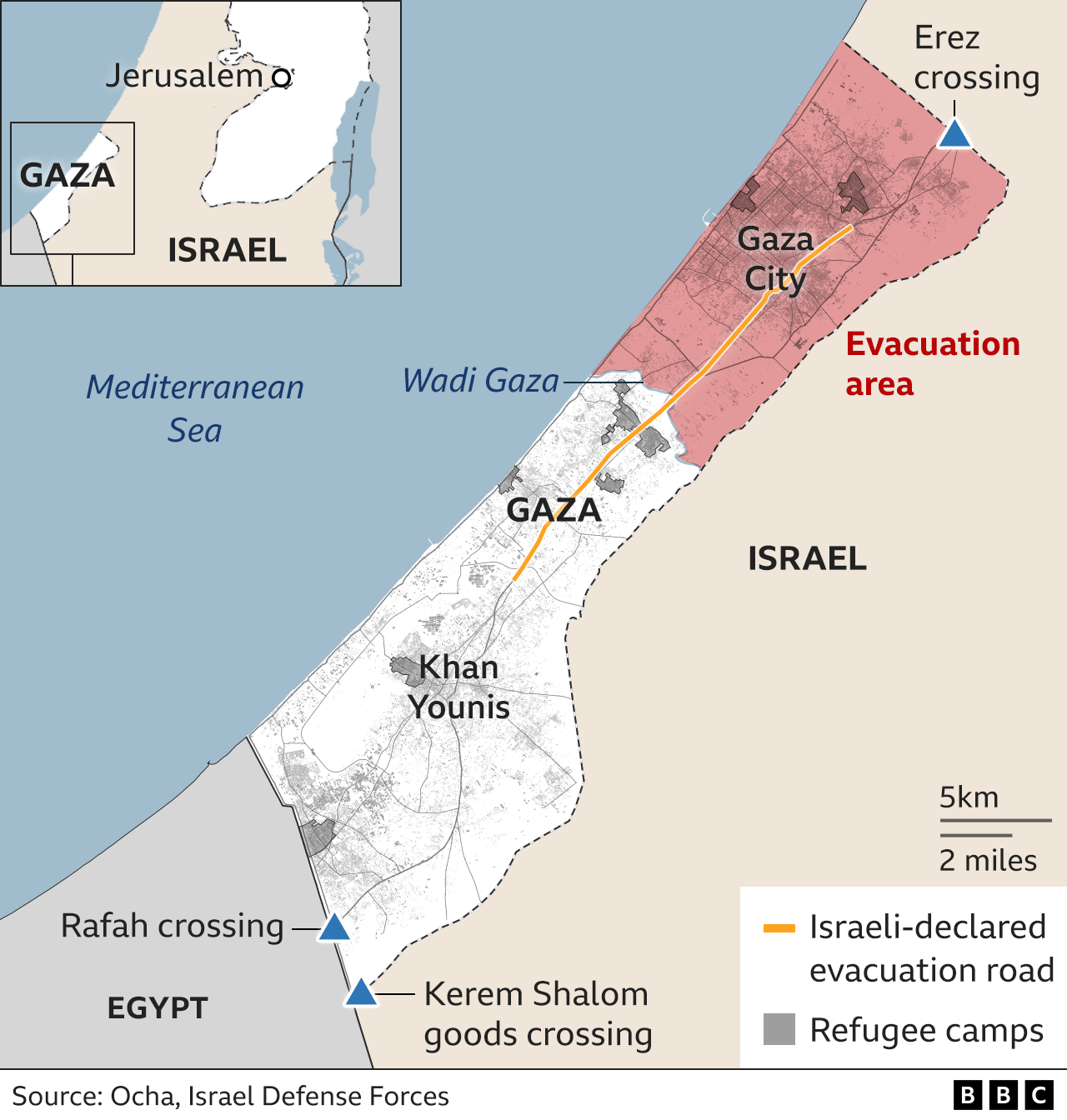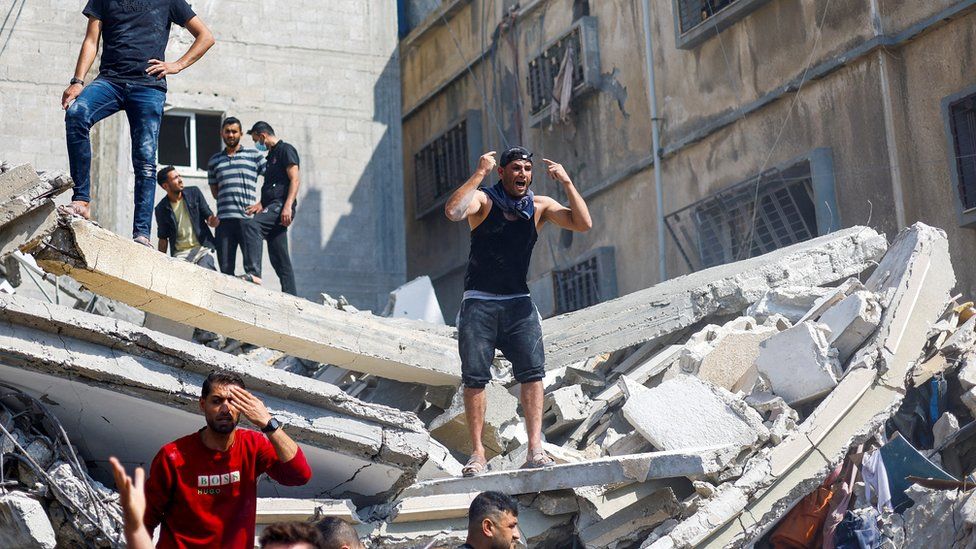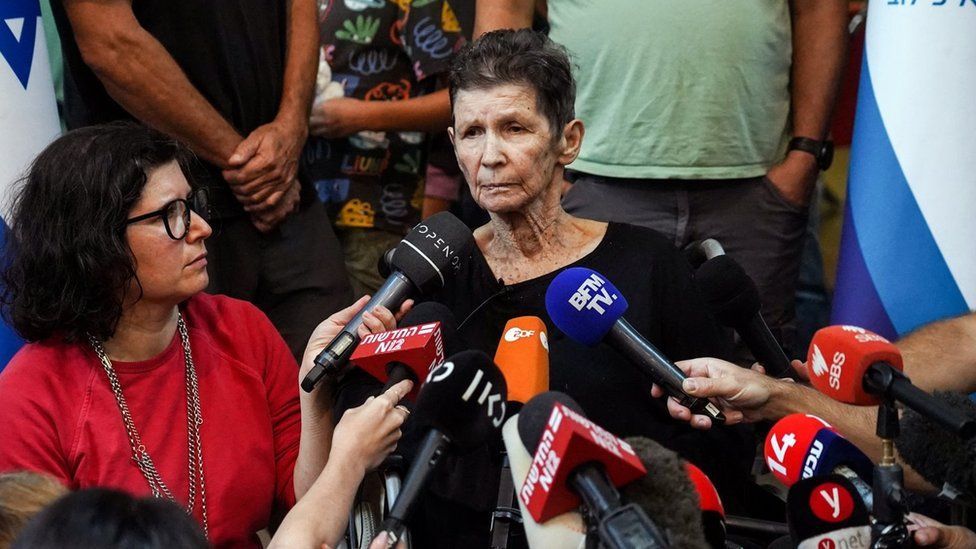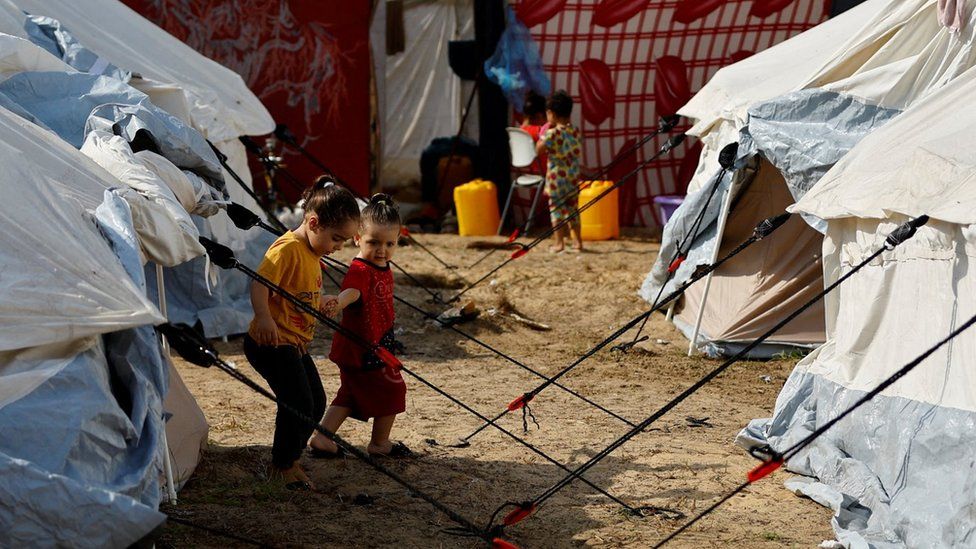More than 700 Palestinians have been killed by Israeli air strikes in the Gaza Strip over the past 24 hours, the Hamas-run health ministry says.
Israel’s military said it struck 400 “terror targets” and killed several Hamas commanders over the same period.
It also declared that it would not reduce its attacks despite Hamas’s release of another two hostages.
UN aid agencies meanwhile pleaded for sustained and safe humanitarian access, warning they were “on their knees”.
A third of hospitals in Gaza are no longer functioning due to shortages of electricity, medicine and staff, and the shortage of clean water is now critical.
Israel launched its bombing campaign against Hamas – which Israel, the UK, US and other powers class as a terrorist organisation – in response to an unprecedented cross-border attack on 7 October in which at least 1,400 people were killed and 222 others were taken hostage.
Nearly 5,800 people have been killed in Gaza since then, according to the health ministry.

Intense Israeli air strikes overnight hit hundreds of locations across Gaza.
Some of those killed in the southern cities of Khan Younis and Rafah were displaced people who had fled the north in response to an Israeli military order to evacuate the area for their own safety, local officials said.
They included 13 members of one family from Gaza City, who had been staying in a residential building in Qarara, on the north-eastern outskirts of Khan Younis, where the population has swelled from 400,000 to 1.2 million.
A relative who survived said: “We were sleeping and suddenly a big explosion happened. All of my family are dead.”
The BBC’s Rushdi Abu Alouf says there was grief, shock and anger at the city’s hospital on Tuesday morning, as bodies were brought out of the mortuary and taken away for burial. Mourners said there was “no safe place” in Gaza.
Later, about 20 people were reportedly killed in a strike on a residential building in the heavily-populated Amal area of Khan Younis.

The Hamas-run health ministry said it had been the deadliest 24 hours of the war so far, with 704 people reported killed, including 305 children, 173 women and 78 elderly people. That brought the overall death toll in Gaza to 5,791, it added.
The Israel Defense Forces, or IDF, said on Tuesday morning that its jets struck “dozens of terror infrastructure and Hamas staging grounds” in several northern areas in and around Gaza City, as well as a “Hamas operational tunnel shaft” near the Mediterranean coastline.
It added that aircraft also targeted Hamas command centres and staging grounds located in mosques, killing the deputy commanders of three battalions of Hamas’s military wing, and also struck dozens of Hamas gunmen setting up to fire rockets towards Israel.
“We want to bring Hamas to a state of full dismantling – its leaders, its military branch, and its working mechanisms,” IDF Chief of Staff Lt Gen Herzi Halevi told commanders on Monday. “The path is a path of unrelenting attacks, damaging Hamas everywhere and in every way.”
He also said that Israeli troops massing near the Gaza perimeter fence were “well prepared for the ground operations” – a reference to the invasion expected soon.
The general spoke before Hamas released two elderly Israeli women – Yocheved Lifshitz, 85, and Nurit Cooper, 79 – who were taken as hostages from the Nir Oz kibbutz close to Gaza on 7 October. Others living there were killed and the women’s husbands remain among those being held.

Meanwhile, the humanitarian situation in Gaza is growing more and more desperate, with shortages of food, water and shelter for the 1.4 million people who have fled their homes.
The health ministry warned the territory’s healthcare system could collapse and 12 of the 32 hospitals in Gaza were out of service. The others were running out of fuel and only running the most essential services.
A spokeswoman the UN agency for Palestinian refugees, UNRWA, which runs the largest humanitarian operation in Gaza, warned that it had also almost exhausted its fuel stocks.
“If we do not get fuel urgently, we will be forced to halt our operations in the Gaza Strip as of Wednesday night,” Juliette Touma told the BBC.
At a briefing in Geneva, UNRWA said just 54 lorries of aid had been allowed to cross through the Egyptian-controlled Rafah crossing since 21 October. Before that, Gaza had been receiving around 500 lorries a day.
Access once the limited supplies are allowed in is also challenging.
The UN has not received the necessary security guarantees to allow aid to be delivered across Gaza, including to the north, where thousands of people, some of them severely injured, remain despite Israel’s evacuation order.
The World Health Organization warned that while some medical supplies had been allowed in they were not enough to meet the needs. Medical personnel standing by in Egypt have also not been allowed to accompany the supplies.
The WHO stressed that fuel, which has so far not been allowed in, was essential for desalination plants, bakeries and hospitals.

The shortage of clean water is now critical, as people only have access to between 1 and 3 litres (34-101 fl oz) of water per day. The basic minimum is 15 litres per day, according to the WHO.
The World Food Programme said it had reduced food rations in an effort to ensure it was reaching as many people as possible.
Emad Abuaassi, who moved from Blackpool in England to northern Gaza with his wife and four children 10 months ago, told the BBC in a voice note that they were now living in a two-bedroom flat in Khan Younis with about 50 other people.
“We’re struggling for everything. We’ve just managed to have half a sandwich – me and my kids this morning,” he said. “The queue is half a mile for a bag of bread.”
“I don’t know what’s going to happen in the next two or three days.”
Israel has agreed to limited deliveries of aid other than fuel, saying that could be stolen and exploited by Hamas for military purposes.
An IDF spokesman posted a satellite photo showing 12 fuel tanks near Rafah which he said contained hundreds of thousands of litres of diesel belonging to Hamas. He alleged that the group “steals the diesel from the civilians and transfers it to tunnels, [rocket] launchers and senior officials”.










22 comments
Whats Taking place i’m new to this, I stumbled upon this I have discovered It positively helpful and it has aided me out loads. I hope to contribute & aid other users like its helped me. Great job.
hello there and thank you for your info – I have
definitely picked up something new from right here.
I did however expertise some technical issues using this site, as I experienced to
reload the website a lot of times previous to I could
get it to load correctly. I had been wondering if your web hosting is OK?
Not that I’m complaining, but slow loading instances times will sometimes affect your placement in google
and can damage your high quality score if advertising and marketing with Adwords.
Anyway I’m adding this RSS to my email and can look out for much more of your respective
interesting content. Ensure that you update this again soon..
Lista escape roomów
I like your writing style really enjoying this web site.
I like this website it’s a master piece! Glad I detected this on google.?
What i don’t understood is actually how you are not really much more well-liked than you may be right now. You are so intelligent. You realize therefore considerably relating to this subject, made me personally consider it from so many varied angles. Its like women and men aren’t fascinated unless it is one thing to do with Lady gaga! Your own stuffs nice. Always maintain it up!
What Is LeanBiome? LeanBiome is a natural dietary supplement that promotes healthy weight loss.
Its good as your other articles : D, thankyou for posting. “Before borrowing money from a friend it’s best to decide which you need most.” by Joe Moore.
Loving the information on this site, you have done great job on the articles.
I need to to thank you for this very good read!! I absolutely enjoyed every little bit of it. I’ve got you saved as a favorite to check out new stuff you post…
I’ve been browsing on-line more than 3 hours as of late, but I never discovered any attention-grabbing article like yours. It?¦s beautiful price sufficient for me. In my opinion, if all web owners and bloggers made excellent content as you probably did, the internet might be a lot more useful than ever before.
It’s nearly impossible to find educated people in this particular topic, but you seem like you know what you’re talking about! Thanks
You need to be a part of a contest for one of the most useful blogs on the internet. I’m going to highly recommend this web site!
Hello there! This post could not be written much better! Reading through this article reminds me of my previous roommate! He continually kept talking about this. I’ll forward this information to him. Fairly certain he’s going to have a great read. I appreciate you for sharing!
I want to to thank you for this very good read!! I definitely enjoyed every little bit of it. I’ve got you bookmarked to look at new things you post…
This site was… how do I say it? Relevant!! Finally I’ve found something which helped me. Thanks!
Good post. I learn something totally new and challenging on websites I stumbleupon everyday. It’s always helpful to read articles from other authors and practice a little something from other websites.
Oh my goodness! Amazing article dude! Thank you, However I am going through difficulties with your RSS. I don’t know why I can’t join it. Is there anyone else getting similar RSS problems? Anyone who knows the answer can you kindly respond? Thanks.
Howdy! I could have sworn I’ve visited this blog before but after looking at many of the posts I realized it’s new to me. Regardless, I’m certainly happy I found it and I’ll be bookmarking it and checking back regularly!
Can I simply just say what a comfort to uncover someone who genuinely knows what they’re talking about on the web. You definitely know how to bring an issue to light and make it important. More people should check this out and understand this side of the story. I was surprised you aren’t more popular given that you most certainly have the gift.
Great blog you have got here.. It’s hard to find high-quality writing like yours nowadays. I really appreciate people like you! Take care!!
I’m impressed, I have to admit. Seldom do I encounter a blog that’s both equally educative and amusing, and let me tell you, you’ve hit the nail on the head. The issue is an issue that too few men and women are speaking intelligently about. I am very happy I came across this during my hunt for something regarding this.
Very good information. Lucky me I ran across your site by accident (stumbleupon). I have saved as a favorite for later!